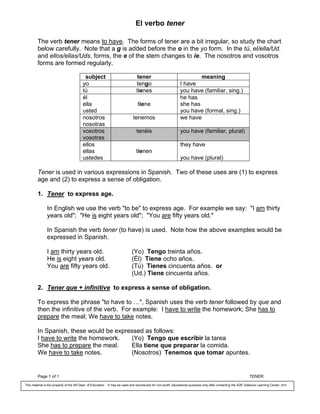
Irregular Verb Tener Forms and Uses
- 1. El verbo tener The verb tener means to have. The forms of tener are a bit irregular, so study the chart below carefully. Note that a g is added before the o in the yo form. In the tú, el/ella/Ud. and ellos/ellas/Uds. forms, the e of the stem changes to ie. The nosotros and vosotros forms are formed regularly. subject tener meaning yo tengo I have tú tienes you have (familiar, sing.) él ella usted tiene he has she has you have (formal, sing.) nosotros nosotras tenemos we have vosotros vosotras tenéis you have (familiar, plural) ellos ellas ustedes tienen they have you have (plural) Tener is used in various expressions in Spanish. Two of these uses are (1) to express age and (2) to express a sense of obligation. 1. Tener to express age. In English we use the verb "to be" to express age. For example we say: "I am thirty years old"; "He is eight years old"; "You are fifty years old." In Spanish the verb tener (to have) is used. Note how the above examples would be expressed in Spanish. I am thirty years old. (Yo) Tengo treinta años. He is eight years old. (Él) Tiene ocho años. You are fifty years old. (Tú) Tienes cincuenta años. or (Ud.) Tiene cincuenta años. 2. Tener que + infinitive to express a sense of obligation. To express the phrase "to have to …", Spanish uses the verb tener followed by que and then the infinitive of the verb. For example: I have to write the homework; She has to prepare the meal; We have to take notes. In Spanish, these would be expressed as follows: I have to write the homework. (Yo) Tengo que escribir la tarea She has to prepare the meal. Ella tiene que preparar la comida. We have to take notes. (Nosotros) Tenemos que tomar apuntes. Page 1 of 1 TENER This material is the property of the AR Dept. of Education. It may be used and reproduced for non-profit, educational purposes only after contacting the ADE Distance Learning Center. RFS
